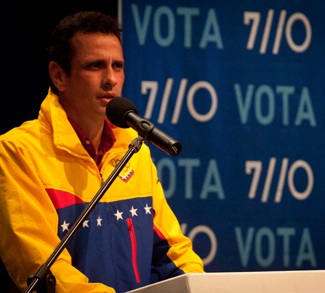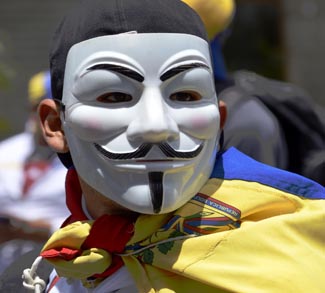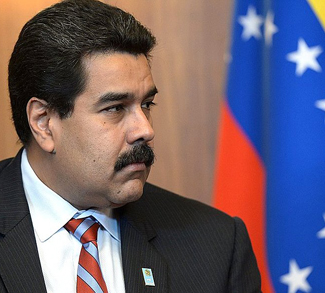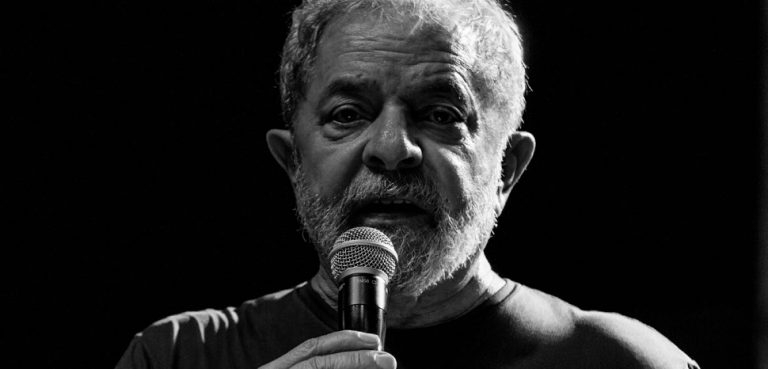It goes without saying that the passing of Hugo Chavez is a very big deal in Venezuelan politics, one that will continue to reverberate for months if not years. There was a funeral (attended by Sean Penn, Mahmoud Ahmadinejad and other such stars of the screen), an official period of mourning (two days to see the Lion of the Left’s embalmed corpse lying in state), and now there will be a more extended period of reflection on Chavez’s legacy in the grand scheme of modern Venezuelan history.
Popular feelings towards Chavez will be overwhelmingly positive as the country comes to term with his passing, and this is precisely why Nicolas Maduro, Chavez’s self-appointed heir, is more than happy to oblige on calling an election within the constitutionally-mandated period of 30 days. He’s banking on popular grief and nostalgia for Chavez’s policies being enough to sweep the United Socialist Party into office for another term. The election will take place on April 14th, and opposition forces have already hit the ground running by boycotting Maduro’s swearing-in ceremony and questioning the constitutionality of him serving as interim president rather than the speaker of the National Assembly.
Current polls indicate that Maduro would triumph in the coming election, a scenario that does not bode well for a thaw in US-Venezuelan relations. Maduro has dropped several indications that he plans to carry on his predecessor’s anti-American tone, notably by suggesting that the U.S. might be behind Chavez’s illness and by kicking out two U.S. military attaches under the accusation of “trying to destabilize Venezuelan politics.”
But to take the inevitability of another United Socialist government as proof of a perpetual flatline in US-Venezuelan relations would be premature. It is a short-term consideration, and it’s only in the medium term that things will likely get interesting.
First off, Maduro will have to grapple with the problem plaguing every political system that favors individual personality over rule of law. A vacuum has opened up at the very top of Venezuelan politics, and it remains to be seen whether Maduro has the charisma, and perhaps more importantly, the personal networks with which to fill it. The Chavez-era Venezuelan state was one that operated on a complex system of personal patronage that led all the way to the top; supporters were rewarded and detractors were marginalized. It remains to be seen whether this system will function smoothly with its head cut off.
Political patronage goes hand in hand with Venezuela’s other pressing issue: an increasingly dysfunctional economy. Many Chavez-era policies could be described as political patronage on a mass scale, and while these policies did help Venezuela’s poor, they tended to be inefficient and short-sighted. For example, the Chavez government’s adult literacy program cost anywhere from $543 to $977 per adult learner. Compare that to Brazil’s program that uses pre-existing educational infrastructure to achieve a cost of $2.50 per learner. In Venezuela’s case, most of this money went into hiring adult literacy trainers, thus providing people with jobs- but only for as long as the government’s finances can hold out.
And by all indications, Venezuela’s finances aren’t going to hold out for very long. The country is currently running a deficit of over 20 percent, and its national inflation rate fluctuates between 20 and 30 percent. Though it presides over one of the world’s largest oil reserves and is a card-carrying member of OPEC, Venezuela’s oil yields have been dropping throughout the Chavez era due to a lack of foreign investment. The same is true of Venezuela’s food industry. A lack of foreign investment, inefficiency, and costly subsidies have stunted overall output, resulting in food shortages that are now showing themselves in the huge lineups spilling out of government food depots nationwide.
A reoccurring theme of Chavez’s economic policy was a willful ignorance regarding the creation of infrastructure and social capital that could drive economic growth beyond the era of direct government handouts. Given the structural challenges that the Venezuelan economy now faces, challenges that will preclude the government’s ability to continue Chavez-era patronage ad infinitum, a Maduro government will inevitably be faced with an economic reckoning of sorts. In the aftermath of this economic reckoning, there will be an opportunity for both domestic opposition forces within Venezuela, and American foreign policy to make inroads.
Just to recap: what we are likely to see is a Maduro win, followed by a politico-economic crisis that ushers in either a return to credible multi-party democracy or a descent into conspicuous authoritarianism.
But how will this impact US-Venezuelan relations?
Given its precarious economic situation, Venezuela will need outside assistance in the near future. And while some would say that China is best suited to step up and bail out Caracas, there are a few reasons to question whether this will actually come to pass. First of all, The Chinese Development Bank has already provided a huge amount of money to the Chavez government, about $40 billion between 2008 and 2012 alone. Thus, if Venezuela were to be faced with a default, it would be Chinese investors with their money on the line. Any debt renegotiations would surely include provisions that didn’t sit well with the Venezuelan public. After all, there have already been agreements reached between Venezuela and the Chinese state-owned company Citic Group that have raised populist alarm bells regarding the signing of mineral rights over to foreign companies.
In this context, a limited rapprochement makes sense from a Venezuelan point of view, as it would balance against a preponderance of Chinese economic influence. Now that the “Bolivarian Revolution” is all but discredited, and countries like Brazil have proven that it’s possible to alleviate poverty through trade and keep US influence at arm’s length, a US-Venezuelan thaw is theoretically possible. However, authorities in Washington will likely have to endure another round of vitriol and wait until the dust settles in Venezuelan domestic politics before their window of opportunity presents itself.




